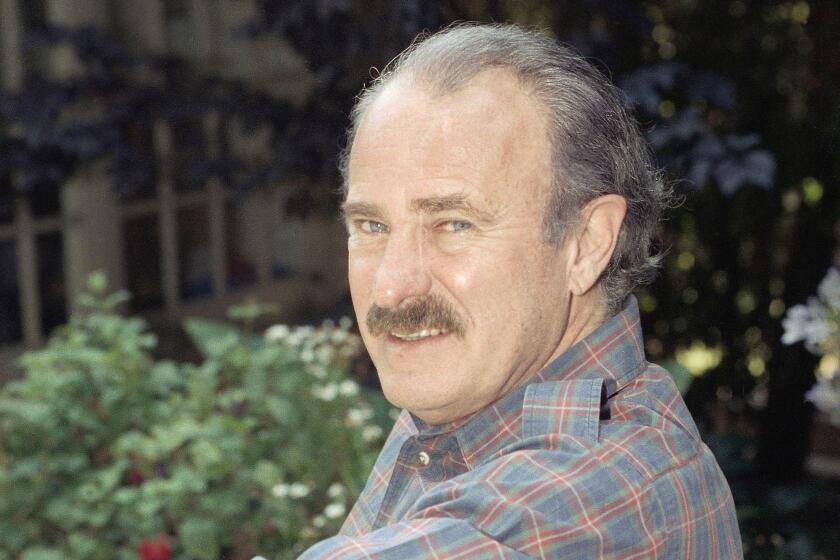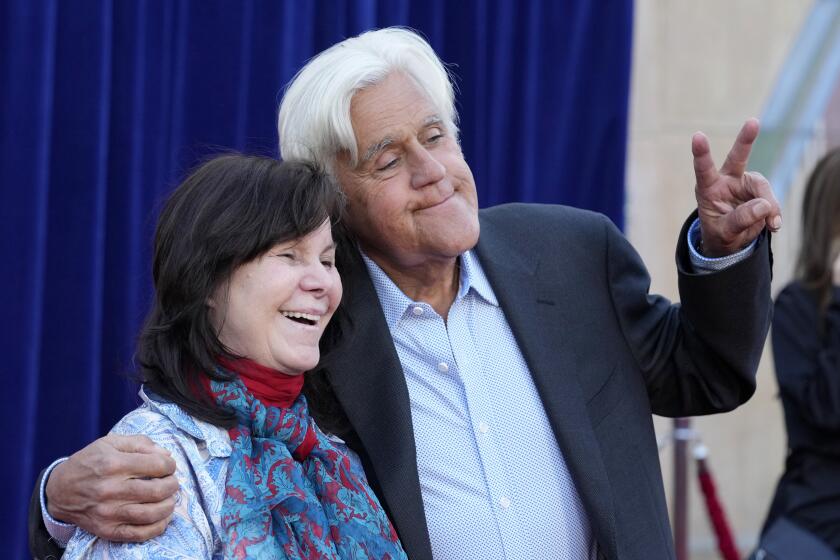Risk Management
Television discovered again this week just how messy “reality” can be, as controversy swirled around “Temptation Island,” the unscripted Fox show that premiered Wednesday night. Yet the persistence of such embarrassments seems unlikely to stem the tide of prime-time reality series, whose potential to attract vast audiences at a lower price than that of scripted dramas or comedies is creating its own irresistible lure for programmers.
So-called reality shows nevertheless remain a high-risk game, as Fox executives learned again this week, acknowledging that a couple featured on “Temptation Island”--which tests the relationships of four unmarried couples by isolating them on an island and having them date attractive singles--hid the fact that they had a child together.
Discovery of the child occurred during the filming, and the pair, Taheed and Ytossie, were removed from the show; however, they were not excised completely and will be featured in early episodes before being ousted at some point during the program’s six-week run.
Even before the tide of reality shows began washing in, media critics raised questions about what might happen as major networks undertook programming formats that create entertainment from the lives of ordinary people who are willing to subject themselves to such exercises in pursuit of fame and fortune.
Some of those fears already have been realized. During the past year, reality programs--a sweeping designation generally used to encompass any unscripted show featuring ordinary people as opposed to actors--have consistently been plagued by unexpected revelations regarding contestants. These include:
* “Survivor” (CBS): Kelly Wiglesworth, one of the show’s two finalists, was wanted by police in Greensboro, N.C., on a 5-year-old warrant for allegedly using a stolen credit card to buy a restaurant meal. “If she comes into North Carolina and we find her, we’d arrest her,” Sgt. K.D. Meredith said in July.
* “Survivor”: Richard Hatch, the ultimate winner, got into trouble after the program had completed taping when Rhode Island child welfare officials charged him with second-degree child abuse. Prosecutors later dropped those charges without explanation.
* “Big Brother” (CBS): William Collins, who preferred to be called Will Mega, turned out to have been an officer of the New Black Panther Party for Self Defense, a group whose leadership has espoused anti-Semitic views.
* “Who Wants to Marry a Multi-Millionaire?” (Fox): Rick Rockwell, the would-be groom, had a restraining order obtained against him by an ex-girlfriend in 1991. There was also evidence that Rockwell, an aspiring comic, misstated his financial status. Fox blamed the producer, Next Entertainment, for an inadequate background check of Rockwell.
Although, in the wake of that fiasco, Fox hired risk-assessment firm PricewaterhouseCoopers to monitor its reality programs, some media experts say the element of risk cannot be eliminated.
“You’re always going to have the possibility of having a skeleton pop up with reality shows, but fame is a funny thing,” said Robert Alaniz, managing director of the L.A. office of Hill & Knowlton, the country’s oldest public relations firm. “It drives people to do funny things, and people may not be as [forthcoming] as they should be if they think it might interfere with that. . . . Producers with the show can only do so much, and then they have to rely on integrity. You’re always going to have this situation.”
Added a former senior network executive, who insisted on anonymity: “I would say it’s unavoidable. I’m not sure there’s any amount of scrutiny that can keep something like this from happening.”
There are those who disagree, including renowned celebrity sleuth Anthony Pellicano, who said he has done background checks for reality shows. Pellicano said that if the child lived with the unmarried “Temptation Island” couple, an investigation should have uncovered the fact.
“The point is, nobody checked,” Pellicano said. “It would be impossible to hide that if the child lived with you. Now if the child is hospitalized or has been put up for adoption, it might be possible to hide. But there is absolutely no way to hide that if the child lives with the parents.”
Moreover, Fox executives knew about the snafu last week but failed to disclose it Sunday during a press conference, at which television writers questioned the ethics and appropriateness of the series. The network subsequently issued a statement saying it was made clear to potential contestants that “no couples with children together could participate in the show. . . . As soon as the producers learned of the existence of the child, they notified the network and the decision was made to immediately remove them from further participation.”
Despite the rash of incidents cited and the spotlight on the ethics behind reality shows, Fox executives proceeded with “Temptation Island” after the couple’s falsehood was discovered. Reediting the show to omit the couple was considered, network sources said, but because the couple was featured in almost every shot with other contestants, it would have been impossible to eliminate them.
“We had a choice to either scrap it or deal with it in the story line,” said one network executive. “So we just decided it should be part of the story line. There is precedent for this because of all of the other things that have happened in reality programming that have been found out after the shows had started filming.”
The persistence of such incidents is nevertheless surprising, given that broadcasters and producers were essentially put on notice regarding the dangers they faced after the “Marry a Multi-Millionaire” flap. Indeed, Fox announced with some fanfare that the network had engaged PricewaterhouseCoopers to prevent similar situations from arising on subsequent programs.
Pellicano scoffed at the use of PricewaterhouseCoopers, saying, “They’re not an investigative agency. They do polls and surveys.”
If the right questions are asked, Pellicano said, the screening process will succeed. “Normally on these types of shows, there is a form and a confidentiality waiver,” he explained. “They are very specific in their requests for information. But these shows also have budgets, and they might just pay enough to do a cursory check to see if there are any criminal cases or a filing of divorce papers.”
Added Voudewin Vanschaik, executive producer of the Dutch version of “Big Brother” that sparked the U.S. edition last summer: “The broadcast stations and the producers have to invest a lot of money on background checks. It’s one of the basic issues in producing this kind of show. Here in Holland, we do psychological tests, medical tests, background tests to the extent that we are 1,000% sure that our house-guests are 2,000% OK.”
*
Yet even European versions of these shows have experienced problems, among them a contestant with a history of mental problems who committed suicide after being voted out of the first Swedish edition of “Survivor” in 1997.
Vanschaik said he hires a private investigator to check out questionable applicants: “We check and double-check and check again. We talk to family members and friends, look at bank accounts, police records. It can take one or two weeks.”
Given the fact that Fox executives are still chafing at the criticism they received for the “Multi-Millionaire” special, industry sources were stunned that such a breach could happen again. Others, however, said it is difficult to forestall such security lapses in light of the lengths to which people will go to be featured on such programs.
Following the “Multi-Millionaire” media circus, Fox executives sought to distance themselves from the genre, saying they would not program more titillating reality fare in the future. Earlier this week, however, Fox Entertainment Group Chairman Sandy Grushow conceded that the overwhelming ratings success of CBS’ “Survivor” had “turned the prime-time network television landscape on its ear,” adding: “We work in a dynamic business. Things change.”
“The mistake [Fox made] was taking up the defensive stance,” said one veteran TV executive.
Fox has been more guarded this time around, making no such pronouncements about backing away from the reality genre in the wake of the latest report about “Temptation Island.” The network again laid much of the blame on the production company involved, Rocket Science Laboratories, saying the producer hired independent consultants to screen contestants for eligibility, including background and medical checks.
*
Critics, meanwhile, worry about the messages sent by such programs, especially when positioned as presenting ordinary people in unusual situations.
“There’s nothing ordinary about these people,” said Michael Josephson, president of the Josephson Institute for Ethics, which was founded in 1987. “These are people who have already made a decision to parade their private lives and put them in jeopardy on television. This is an extraordinarily select group, and yet we feel compelled to generalize about society based on them.”
Such programs, Josephson added, “are the furthest possible thing from reality. People know that, in order to succeed on these shows, they have to be interesting or dramatic.”
Even before these incidents occurred, many foresaw problems with the reality genre. Asked about the trend a year ago--before the broadcast of “Marry a Multi-Millionaire”--former NBC Chairman Grant Tinker said, “I suppose there’s no limit until somebody does something so offensive that they’ll stop. . . . There’s a kind of desperation about it.”
Still, there is reason to believe that a degree of controversy, in a crowded television environment in which programmers increasingly struggle to get their shows noticed, simply plays into a network’s hands.
“What could be interpreted as slightly negative publicity could be perceived--in the end--as good publicity,” suggested Hill & Knowlton’s Alaniz. “If people are talking about it, is it necessarily a bad thing for the network? This couple that has a child, well, it just adds a little spice to the show.”
*
Times staff writers Paul Brownfield and Dana Calvo contributed to this story.
*
Inside
* ABC’s “The Mole”--with Anderson Cooper, above--and Fox’s “Temptation Island” debuted with solid ratings. F39
More to Read
The complete guide to home viewing
Get Screen Gab for everything about the TV shows and streaming movies everyone’s talking about.
You may occasionally receive promotional content from the Los Angeles Times.







